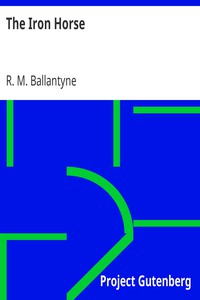The Iron Horse, R. M. Ballantyne [howl and other poems .txt] 📗

- Author: R. M. Ballantyne
Book online «The Iron Horse, R. M. Ballantyne [howl and other poems .txt] 📗». Author R. M. Ballantyne
Over the mountain and round by the lea,
Though the black tunnel and down to the sea.
Clatter and bang by the wild riven shore,
We mingle our shriek with the ocean’s roar.
We strain and we struggle, we rush and we fly—
We’re a terrible pair, my steed and I.
Chorus—Whistle and puff the whole day round,
Over the hills and underground.
Rattling fast and rattling free—
Oh! a life on the line is the life for me.
With our hearts a-blazing in every chink,
With coals for food and water to drink,
We plunge up the mountain and traverse the moor,
And startle the grouse in our daily tour.
We yell at the deer in their lonely glen,
Shoot past the village and circle the Ben,
We flash through the city on viaducts high,
As straight as an arrow, my steed and I.
Chorus—Whistle and puff, etcetera.
The Norseman of old, when quaffing his mead,
Delighted to boast of his “ocean steed;”
The British tar, in his foaming beer,
Drinks to his ship as his mistress dear.
The war-horse good is the trooper’s theme—
But what are all these to the horse of steam?
Such a riotous, rollicking roadster is he—
Oh!—the Iron Horse is the steed for me!
Chorus—Whistle and puff, etcetera.
The collation also, or, according to Bob Marrot, the “blow-out,” was superb. Joseph Tipps declared it to be eminently satisfactory, and the men of the line evidently held the same opinion, if we may judge from the fact that they consumed it all, and left not a scrap behind.
The speeches, also, were excellent. Of course the great one of the evening was the best being, delivered by Mr Abel, who not unnaturally made a remarkably able oration.
When that gentleman rose with a beautiful silver model of a locomotive in his hand, which he had been deputed by the men of the line to present as a mark of their regard, admiration, and esteem, to John Marrot, he took the worthy ex-engine-driver very much by surprise, and caused Mrs Marrot to be seized with such a fit of choking that the baby (not the new one, but the old) found it as hard work to beat her out of it, as she had formerly found it to beat him out of a fit of wickedness. When she had been restored, Mr Abel launched off into a glowing oration, in the course of which he referred to John Marrot’s long services, to his faithful and unwearied attention to his arduous duties, and to the numerous instances wherein he had shown personal courage and daring, amounting almost to heroism, in saving the lives of comrades in danger, and in preventing accidents on the line by coolness and presence of mind.
“In conclusion,” said Mr Abel, winding up, “let me remark that the gift which is now presented might have been of a more useful character, but could not have been more appropriate; because the wish of those who desire to testify their regard for you this evening, Mr Marrot, is not to give you an intrinsically valuable or useful present, but to present you with a characteristic ornament which may grace your dwelling while you live, and descend, after you are gone, to your children’s children (here he glanced at Loo and her troop), to bear witness to them that you nobly did your duty in driving that great iron horse, whereof this little silver pony is a model and a memorial. To perform one’s duty well in this life is the highest ambition that any man can have in regard to temporal things. Nelson, our greatest naval hero, aimed at it, and, on the glorious day of Trafalgar, signalled that England expected every man to do it. Wellington, our greatest soldier, made duty his guiding-star. The effectual and earnest performance of duty stamps with a nobility which is not confined to great men—a nobility which kings can neither give nor take away—a nobility which is very, very difficult to attain unto, but which is open alike to the prince and the peasant, and must be wrought hard for and won—or lost with shame,—for, as the poet happily puts it—
“‘Honour and shame from no condition rise;
Act well your part,—there all the honour lies.’
“For myself I can only say that John Marrot has won this nobility, and I couple his name with a sentiment with which all here, I doubt not, will heartily sympathise.—Prosperity to the men of the line, and success to the Iron Horse!”
Reader, we can do no better than echo that sentiment, and wish you a kind farewell.
The End.




Comments (0)